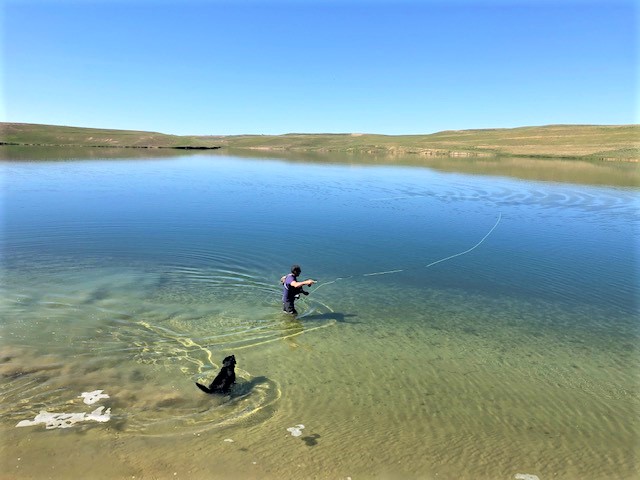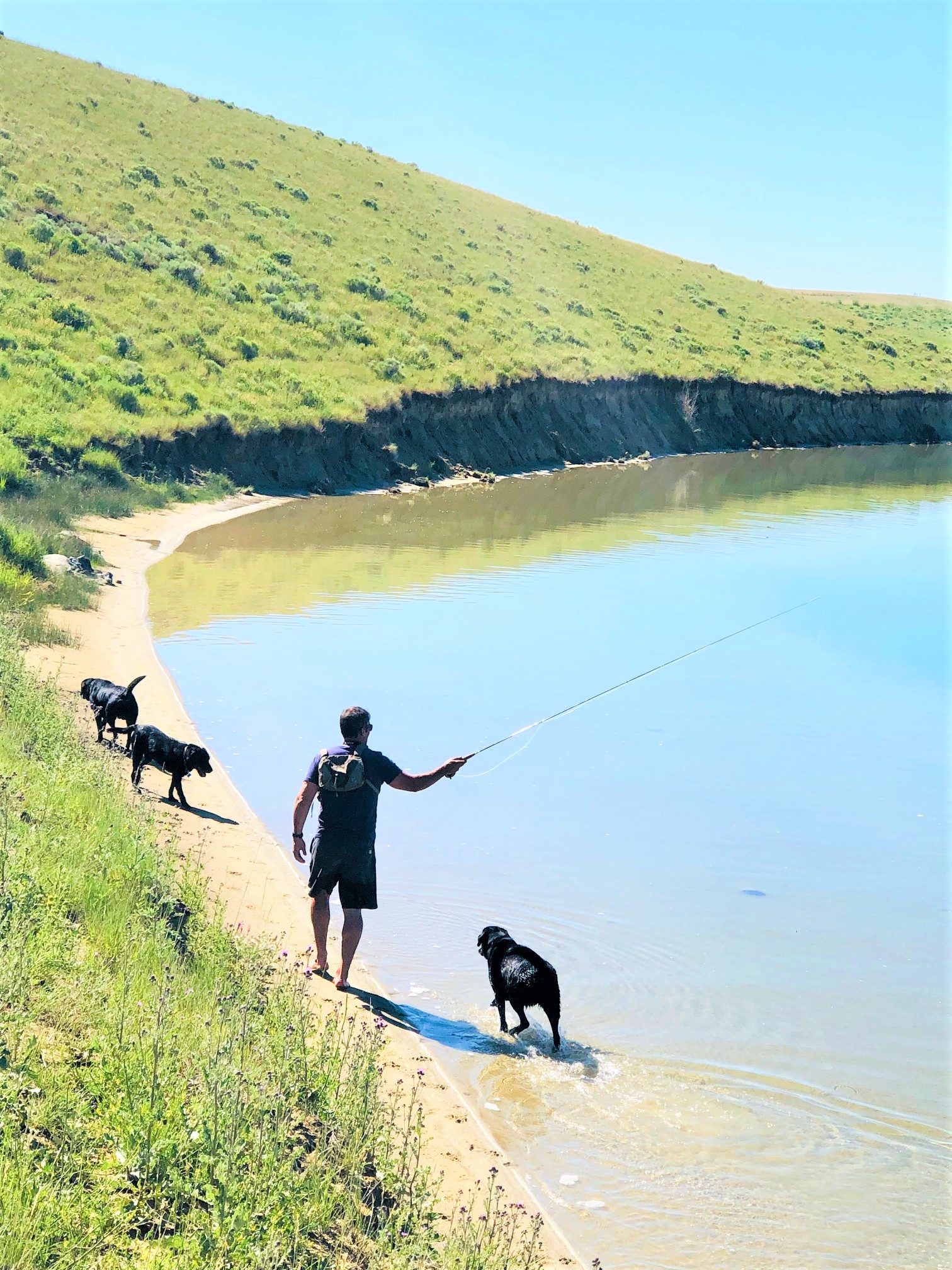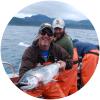In the mid-90s I lived in a craftsman two-story within walking distance of the University of Wyoming campus in Laramie. The house was so close to the university that frequently errant Frisbees landed in the front yard. My roommate was Patrick Amelotte, a graduate student of English who had just moved to Wyoming after a deployment as a Marine in the first Gulf War. We both had Labrador Retrievers, we both liked to go to the Cowboy Saloon, and we were each just learning how to fish the lakes around town. We’d drag our canvas belly boats out to Twin Buttes, or Lake Hattie, and kick out past the weed line to catch the evening caddis hatch. The grass was so dry that summer it seemed to crackle. And, at night, after the thunderstorms passed without producing any rain, you could hear the inaudible murmur of the announcer at the town rodeo. Pat and I drank beers on the porch and talked literature, or fishing.
This week, Pat and I went for a drive outside of Casper in search of a lake and a few rising trout. Pat, who teaches writing and Intro to Shakespeare at Casper College, is married and is often busy with his kids, tending his garden or keeping his bees. But we found a rare chance to get away, if only for a few hours, and we headed for the familiarity of the lake. We don’t have belly boats and fins these days—those kinds of things seem like relics of a prolonged adolescent now. It was too hot for waders. We decided on a turquoise lake out in the sage. We figured we’d stroll along the steep banks and go barefoot in the shallows.
Lake fishing in Wyoming often plays second fiddle to our pristine cold-water streams; I’ve never understood why. Stillwater fly fishing presents whole new universes of opportunities. The insects are different. There are entirely new species of crane flies, damselflies, and annelids that you won’t find in rivers. In lakes there are, for example, the much beloved giant caddis flies that emerge in the August evenings to scoot along the surface in vibrating arcs. The insects make a mad dash for the safety of the shoreline, while the trout try to intercept them. Trout spot the silhouettes and chase them aggressively, slashing at them and going completely airborne in the process. I have more luck with dry flies on lakes. And so many people fish the creeks and rivers that the lakes in Wyoming stay relatively untouched, especially the lesser-known lakes that speckle Natrona County. Often, migrating white pelicans roost there, and sand hill cranes choose the marshy outlets of these lakes to raise their colts. A perfect evening is when the caddis are “coming off” and you happen to have a size 12 Goddard caddis soaked in Gink floatant. Pat and I learned many years ago how to strip the fly line and make the caddis skip across the surface like the real thing.

The lake was right where we left it last time. We had three black Labs with us. They immediately sprinted down the shoreline and terrorized a group of resting geese. Pat’s new dog, an athletic male named Marshall, crashed into the water and swam out to the middle of the lake. We began to think he wasn’t coming back.
Pat has owned a Lab for as long as I’ve known him. He was there when I had to put my first dog down. And I had the sense to look away when his old Jake began to stumble and fall, his hips succumbing to dysplasia. We’ve seen our share of great fishing dogs come and go. We’ve both moved around the country to try living in other states. But we each settled in Casper. Two of the things that keep us in Wyoming are the lakes and the rising trout. Another thing that keeps us is our on-going conversation that’s lasted years and shows no sign of letting up. When I fish with Pat I can bring up an essay, say, E.B. White’s classic “Once More to the Lake”, and I have an interlocutor who knows what I’m talking about.
Rainbows, browns, cutthroats, and brook trout need moving, oxygenated water to spawn successfully. So the trout we fish for in lakes are stocked by the Wyoming Game and Fish. In the dead of winter I will attend informational meetings put on by the Game and Fish so that I can know where the fishing will be best in the summer, which lakes and reservoirs have tiger trout, which lakes hold grayling up to sixteen inches. The wardens and biologists are very upfront with this type of information; they want you to get out there and catch fish. All you have to do is ask. People who like pan-fried trout are encouraged to take a few from lakes. A lake trout is captured, more or less, his genetic code trapped. But don’t feel sorry for these fish. They cruise the shoreline and feed in pods as the sunlight pours over the rise of sage and sand-colored buttes. I’ve seen them rise to my fly, inspect it, and turn away.

Pat and I caught some trout, little silver rainbows that wobbled the surface of the tranquil lake. We continued our decades-long conversation about authors, history, and people we’ve known. We wrangled the dogs and tried to keep them out of the leaders when they spotted a hooked fish and crashed in to investigate. A landowner and his son drove up in a truck to ask how we were doing. The rancher has restored a sheep wagon and rents it out to people who want to spend the night like a turn-of-the-century shepherd and wake up surrounded by sage and birdsong. He pointed to a rise and I suddenly spotted the canvas roof of the green sheep wagon.
“It’s got a stove and everything in there. It gets cold out here, even in the summer,” he said. He told us that he once recorded a winter temperature of negative 48. “I only rent the wagon from May to October. I couldn’t sleep if I had people out here and one of those winter storms rolled in.”
Pat thought it might be fun to bring his family out to the sheep wagon for a weekend. He asked for a card.
After the landowner drove away, we walked barefoot along the sandy shoreline and sight-casted to little rainbows and cutthroats. Pat said that he brought his family out to this spot for the Fourth of July. They were the only ones. They had a cookout and, as the light fell, the kids lit fireworks that flew up and exploded over the reflection of the lake.
“Your kids will remember that when they’re sixty-years-old,” I said. I said that those kinds of experiences are cherished, even by our fast-paced society. Even in the age of Facebook and Instagram.
“I hope so,” he said.
He is often understated about what he sees in the world. He often keeps his conflicts within. It was time to head home anyway. We drove out on the ribbon of dirt road passing antelope and their newborns. The grass was waist-high and the drought seems to have passed. We didn’t say too much. We just drove. We have years to finish the conversation.




